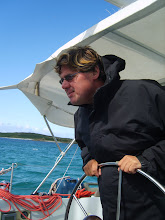Authority is no more. And let's be thankful it is. I just attended the speech from Andrew Keen and his frightening message of internet killing our wisdom. I think it's a load of soft smelly street ornament.
I won't go into the exact contents of his speech. It can easily be found in his book, on the web and perhaps he'll try shoving it down your throat as well.
What I will focus on, is the underlying message of elitism. Unpopular though hippies may be nowadays, they did one important thing and that is do away with authority. I don't mean there are no longer people who are experts in a subject. It does imply that expertise in one field no longer leads to authority beyond that. Or even of authority in the field itself.
Is this necessarily bad? It is if you like authority. It is not if you prefer genuine experiences. In general, authority inhibits true delving into the other as a person. It requires formal obligations to be observed which are generally counterproductive in achieving true interaction. And in learning, true interaction - both live and virtual - is the prime objective (apart from the others, such as don't disturb foreign worlds with a lower level of development).
So authority is not bad just because it's not democratic. Democracy is a lofty goal, not a label you can stick on something, though that's a different discussion. Authority is bad because it keeps us from being our true selves. If I am put in the role of expert and others expect me to be an authority, it prevents me from expressing my doubts which are inherent and necessary in any learning environment. If I can be just a contributor, my expertise can be judged objectively.
We don't need another generation of power hungry authority figures. And especially not male ones.
Recognize the model? Male, ageing, expert: the professor. Yesterday's authority.
Web 2.0 liberates us from him. Let's keep it this way. Collaboration does that.
29 Nov 2007
Why authority is suspect
Labels:
collaboration,
conference,
e-learning,
e-leren,
education,
knowledge transfer,
Online Educa,
web 2.0,
wiki
Subscribe to:
Post Comments (Atom)

1 comment:
Yes!! You are so right, collaboration and solidarity are at the basis of new knowledge. Let's keep it this way.
Post a Comment